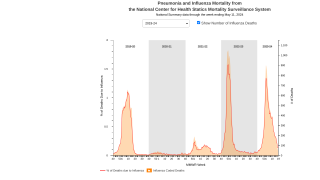China’s Bird Flu Mutating and Spreading

Among the influenza viruses circulating the world today, the Asian avian influenza A (H7N9) virus (Asian H7N9), is ranked as the highest potential pandemic risk. Since March 2013, there have been 1,557 cases of H7N9 reported worldwide.
H7N9 isn't your run-of-the-mill bird flu.
Known to be circulating only within China, H7N9 has been mutating this past year, putting scientists on alert as the strain enters its sixth winter.
The Chinese government reported 759 cases of H7N9 and 281 deaths so far in 2017. All infections were caught in China, Hong Kong or Macao. Nearly 40 percent of those infections were deadly.
By comparison, China reported just 226 cases in 2016.
H7N9 geographic spread has widened, with infections in humans and poultry reported in most areas of China, including provinces bordering Vietnam and Laos.
Which raises the chances of the virus spreading to other countries.
H7N9 is "the influenza virus with the highest potential pandemic risk," the Centers for Disease Control and Prevention (CDC) reported.
Although H7N9 has potential to evolve into a global threat, the virus doesn't transmit easily between people. About 90 percent of people catch the virus by handling poultry.
But person-to-person transmission is possible. And, children should be kept away from sick and dead animals.
During 2017, there were 14 clusters of cases in which a person passed the disease to at least one other person.
The more H7N9 circulates, the greater the chance it will infect people, raising the likelihood the virus will adapt to humans and disperse through coughing and sneezing.
Thus far, most Chinese patients with H7N9 infection have had severe pneumonia.
With little if any immunity among people, the potential for a pandemic is evident.
The H7N9 virus can cause a severe form of pneumonia and progress into septic shock and organ failure, says the World Health Organization.
Medications known as neuraminidase inhibitors, such as Roche Holding AG’s Tamiflu and GlaxoSmithKline Plc’s Relenza, are recommended by the CDC.
Currently, no vaccine for the prevention of H7N9 infections in humans is commercially available. On a positive note, researchers are working on vaccines.
And, the Chinese Ministry of Agriculture is testing a vaccine program for poultry vaccinations.
Our Trust Standards: Medical Advisory Committee
- Global concern regarding the fifth epidemic of human infection with avian influenza A (H7N9) virus in China
- Human infection with avian influenza A(H7N9) virus – China
- EpiVax Awarded Grant For Vaccine Engineering
- Frequently Asked Questions on human infection caused by the avian influenza A(H7N9) virus
- China is closely monitoring an increase in infection with avian influenza A (H7N9) virus

























